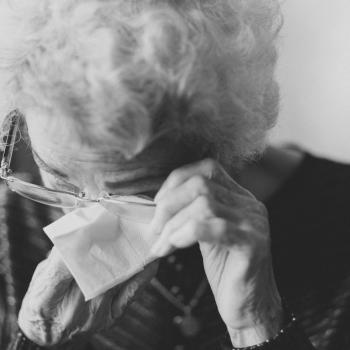
The following comes from someone with eighteen years of unwanted experience in the chronic illness department, with a heart for other ill people, and those who care for them. If you’re a caregiver or friend of the ill, perhaps you’ll have an “Aha!” moment as you read. If you’re ill, maybe you’ll have a “I’m not alone after all” moment. So here goes. Some insight from someone who suffers, and who cares for a suffering parent:
First, realize the sick may occasionally (or even regularly) need some space. It’s not that we’re anti-social, awkward, distant, mean, mad, or any number of negative emotions or character traits. It’s that we don’t feel well, and we may need to leave a party or get together prematurely, not attend at all, or never commit to attending in the first place. At times, we may prefer to simply lurk around the outskirts of a party and observe, as that’s all we have the oomph for.
Some, maybe most days, a simple coffee date could be too much too handle. Because when we get home, the chores still need to be done. People are hungry, the pets need to be fed, the bathroom needs cleaned, laundry is piled high, and bills are still unpaid because last week was so debilitating. If any of that is the case, and we go to coffee, we are forced to scratch everything else off of our list, or find someone else to do it. Or just let it go, which works great until you’re famished, there’s nothing in the fridge, and you are too drained to shop. Or until your electricity gets turned off because in a fit of brain fog, you failed to pay the bill.
Life for the chronically ill is akin to running from that massive, round boulder in Raiders of The Lost Ark. Things can quickly pile up on us. It’s terrifying, really, because we don’t run swiftly.
Second, the sick only have so many spoons. You can read more about the Spoon Theory if you’d like. But in a nutshell, it states that chronically ill people wake up each day with only so many spoons. The more spoons we have, the more energy we have, but we don’t typically have the same number of spoons every day. Some mornings, we have two spoons. Sometimes a dozen spoons. Sometimes, we wake spoonless. We can go to bed feeling as if the next day will be fantastic, only to wake with pain, brain fog, tingling, debilitating fatigue, dizziness, muscle weakness, nausea, and an inability to eat much. So please be mindful that we are not dealing with a full drawer of spoons like many people. We rarely have enough spoons to last us until bedtime. Most days, we barely have enough spoons to get us to nap time.
Third, the sick need grace. Every day, there’s some level of discomfort. Perhaps we can power through. Perhaps we can’t. Please give us grace when expecting us to do what you want, or even what we’ve committed to. We often overcommit, mostly out of a heart that wants to serve and be part of a community. We sign up for things when we’re feeling well, thinking “Hey! I feel great! I can handle anything!”, only to find out that the day we are expected to deliver, we can’t. This disappoints us, and we know it disappoints you, and we are learning how to best deal with our fluctuating limitations and abilities. But we don’t always get it right, and we are at your mercy for understanding and longsuffering.
Fourth, chronic illness is isolating. Think how it is when you have the flu. After four or five days of lying around, you get cabin fever and are ready to once again go out and conquer the world. Truth is, lying around is boring, being sick is torturous on the body and mind, and if you don’t get out of your humble abode and experience some human interaction and fresh air, you feel you’ll shrivel up, waste away, or be committed to the Funny Farm. Chronically ill people experience this anywhere from one to every day of the week, fifty-two weeks of the year. As a result, it’s common for us to feel isolated, out of the loop, and sheltered.
What can you do for us? Send us a card, leave us a message with an invite to call back if we are feeling up to it, or tell us what’s going on with you. We love to hear about you and yours. Why else would we be on Facebook enough to qualify as the “chief of sinners”?
What can we do for you? If I can say this without sounding haughty … the truth is that suffering people are often more empathetic and gracious than most. We know what it is to suffer and not have life go as planned. We know trials like the back of our hands, and we like to skirt around small talk (read: nix it all together) and get to the juicy stuff. We don’t understand small talk because we live life on a battlefield and develop Blue Humor. So allow us to listen. Be open and honest about your troubles and worries because we’re accustomed to both. It’s our territory. We want to hear about the good, but also the bad and ugly because it reminds us we are all in this glorious, frustrating, difficult journey called life together, and it doesn’t always look like a bed of light pink roses — my fave, in case you decide to cheer me up someday.
Was that presumptuous? I forgot we were talking about what we can do for you.
Fifth, just because we look good doesn’t mean we feel good. I have often said that the hardest part about my illness is that I look fine, so therefore the expectation is that I will act fine. Be energetic. Act my age.
I get the “but you look so good!” line quite often, and while people mean well, depending on how it is said, it can make me feel invalidated. As if because I look well, I can’t possibly be sick. I know girls like to look good, but this girl likes to also be well, and I’m not. A more appropriate thing to say would be, “I’m sorry for your troubles, and I’ll be praying for you. In fact, can I pray right now?” Or “I didn’t realize it was so difficult. Anything I can do to help?” Or even “You’d never know you were sick, because you look good, but it sounds very difficult, and I’m sorry for that. I’ll be praying.” Or “Crikey! Can I bring dinner over?” Something along those lines.
Sixth, we appreciate your concern for us, but depending on our condition, and what medicines we are taking, we may not be able to try whatever treatments or natural supplements have worked for you, your mom, your sister, or your friend. Certainly not your puppy. Please don’t be offended when we say no. It’s nothing personal. It’s just life, and we are doing the best we can to find healing this side of heaven, while knowing that our ultimate hope lies on the other side of heaven. We’ve learned not to put our hope in treatments and medicine, but neither are we closed to such things. Every situation is different. Everybody and every body is different. What works for one, doesn’t always work for all, even though it makes you look and feel like a trillion bucks. And you do look like a trillion bucks, I might add.
Seventh, kindness is key. Many traits are wrapped up in kindness, such as understanding, forbearance, patience, being slow to anger, and gentleness, and the chronically ill will open like a blooming flower in Spring if you treat them kindly.
To wrap up, chronically ill people are not a lot different from people who suffer from short-term illness, in that they need the same things. The hard part for those doing the forbearing and caring is that the illness seems eternal. As a result, the sick often cause those around them to be weary of them, and they weary of themselves. Ongoing illness can be self-deprecating, self-loathing, and self-focused, if we aren’t careful. So can caregiving. My goal in writing this was not to be self-focused, but to get out in the open what largely becomes misunderstandings when it comes to how to effectively interact with the chronically ill.
Jesus often took pity on the ill, healing them, being gentle with them, and admiring their faith.
“Take up your bed and walk.” (John 5:8)
“Your faith has made you well.” (Matt. 9:22)
“I have not found such great faith in all of Israel!” (Luke 7:9)
These are the words of Jesus to sick people of ages past. But Jesus doesn’t always heal. He didn’t heal every sick person He came into contact with, and He works the same today — healing some, not others, but always giving what’s best for an increase in faith and trust in Him. And so, though the perpetually ill struggle on their own, with others, and sometimes against others, they are coming to know that all things work together for good to those who love God, to those who are the called according to His purposes. (Rom. 8:28)















